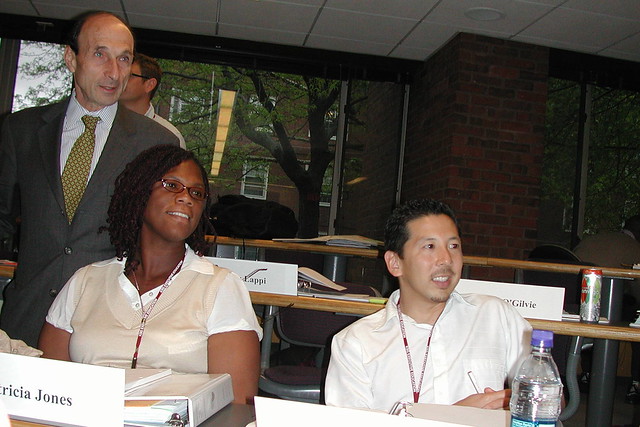The leadership program, which was offered through Harvard’s Kennedy School of Government, was intensive. But at the end of each twelve hour day, I was both exhausted and energized.
The pedagogy was like nothing I’ve seen before. The faculty worked to create and enact the very ideas we were discussing. It was somewhat mind-boggling. The theme was “Chaos, Conflict and Courage,” and we saw plenty of all three.
In practice this meant that we were engaging not just intellectually, but also emotionally. Head and gut. That’s necessary for learning on this topic.
Not everyone saw the value of this approach immediately. Some people (mostly the Type A personalities) were upset by the techniques, and their dissatisfaction grew as the week went on. They wanted their money back. Eventually they organized an uprising which tried to take over the class and get it back on track. Apparently, this is pretty standard stuff in the program. It’s all part of the plan. It was amazing to me to watch an attempted classroom coup taking place, and to realize that the instructor kept the discussion on topic throughout the whole thing, even when he temporarily surrendered the class to a student.
I believe at the end of the program most of the skeptics had come around. Some people had moments of revelation where everything clicked. For me it was more subtle.
Obviously I can’t convey the substance of so many hours of experience here in a succinct little nutshell. I certainly can’t recreate the emotional experience. Nevertheless I can put forward a few of the more provocative ideas:
- Leadership and authority are not the same thing.
- Organizations want to keep individuals well within their scope of authority.
- Staying within that scope means confining work to technical matters.
- Technical solutions only go so far. Truly complex problems require adaptive solutions.
- Adaptation means change. Change entails loss. Leadership is about confronting people with loss. People resist change. No one wants to sustain a loss. Therefore leadership is a dangerous activity.
- Leadership always entails casualties. So-called “win-win” solutions are rarely what they seem to be. (I’m still conflicted about this one.)
- We are never authorized to exercise leadership. It is inherently subversive.
- Opportunities to exercise leadership are available to just about everyone.
Honestly, I could have gotten these ideas from reading a book. In fact, I did. The advantage of attending the program in person was taking these concepts to a more visceral level.
One final observation: Here in New Orleans, most everyone who heard I was going to this seminar expressed intense interest. I think a recent poll by the University of New Orleans gives an indication of why. They’ve been conducting a quality of life survey every six months for the last 21 years. The number one issue on people’s minds has always been crime — until now. For the first time ever, something else has topped the list, namely government. If I may interpret, I believe what people are upset about is a lack of leadership. Our crisis has created an unusual situation. We are longing for those in authority to help us with difficult changes. That’s why neighborhood groups and citizen-led initiatives are intervening in places you’d normally expect to find government. We are exceeding our authority and intervening in our own destiny.

Exciting B. ! I am reading Art of the Impossible. I have had this book for a few years and now am reading it at the right time. It is about the citizen leadership that rose after the fall of Communism. Havel has a wonderful perspective on morality and enormous responsibility of politicians and the reason that strong citizens became the natural leaders after the Velvet Revolution. Glad you were able to get out for a spell.
Wow–that sounds amazing. I was reading this post just nodding emphatically throughout.
While you were enjoying the Muddy banks of the Charles River I have been reading “Nothing, Nobody” by Elena Poinatowska. It is about the 85 earthquake and the void of government.
Amoung other things.
There was a fissure here in New Orleans, and now the powers that be are trying to close it, keeping it open is even harder work than ever.
We still need vigilant citizens, as the next Hurricane Season approaches and we seem to be just as vulnerable as ever, if not more it will be interesting to see how this plays out.
So well said, b. I think our pointed restlessness (“neighborhood groups and citizen-led initiatives are intervening in places you’d normally expect to find government”) is fed by this feeling that an unparalleled opportunity for substantive change exists amidst all the garbage heaps.
The good people of New Orleans deserve to finally be served by a government–all of its tentacles, including the Army Corps–of equal merit.
[…] only professor I can think of with a similar presence would be Marty Linsky, whom I encountered at Chaos, Conflict and Courage. I found it almost impossible to take notes while David spoke, but I did jot down that he asked his […]
[…] only professor I can think of with a similar presence would be Marty Linsky, whom I encountered at Chaos, Conflict and Courage. I found it almost impossible to take notes while David spoke, but I did jot down that he asked his […]